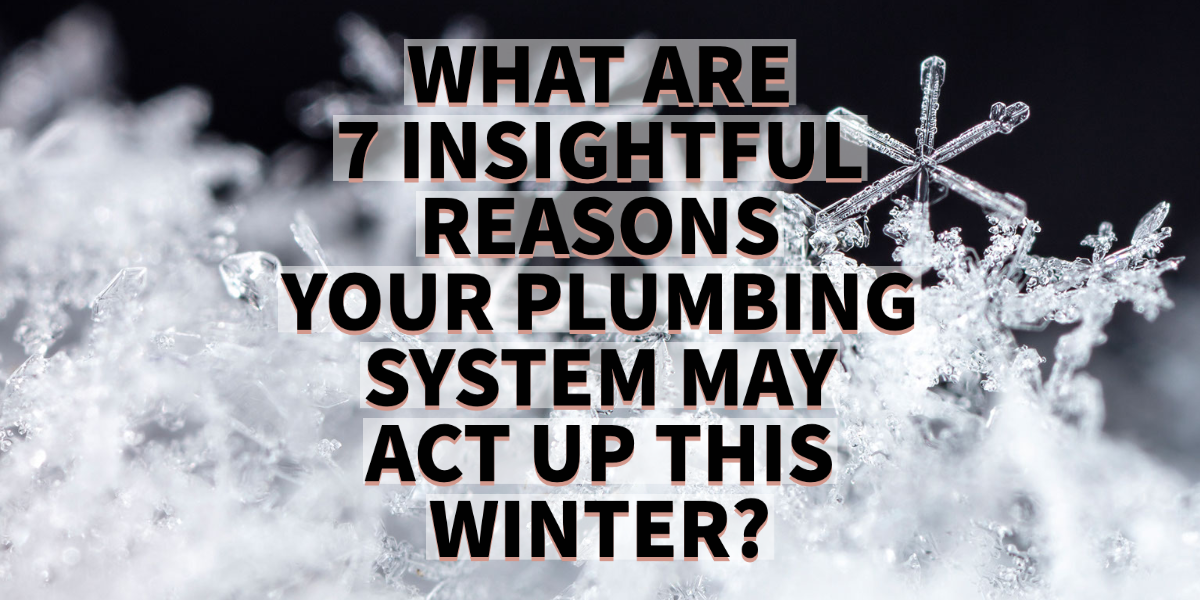Wintertime in Ohio can be harsh, especially on your plumbing. But by taking a few preventative measures and knowing what common winter plumbing issues to look out for, you can help keep your home’s pipes healthy all season long. And if any problems do arise, Canal Winchester Plumbing & Drain will be there to help!
1. IS YOUR KITCHEN DRAIN CLOGGED?
Many people have parties during the winter, which means extra cooking and more strain on the garbage disposal. If you’re not careful what you put down there, it can easily get clogged. Avoid this problem by steering clear of certain foods going in the disposal, such as cooking oil, fats, grease, eggshells, coffee grounds, meat bones, vegetable peels, corn husks, or potato/onion skins. Your garbage disposal is not the only way to get rid of food scraps. There are other options that won’t overload or damage your plumbing system. Be mindful of this during holiday cooking, when you’re likely producing a bit more food waste than usual.
It’s important to remember that you should never pour dense food down the sink. This includes pasta, potatoes, and rice. They can swell and cause clogs in your pipes when they come into contact with water. Instead, scrape these kinds of food into the trashcan. A garbage can placed near your kitchen sink will help remind guests where to put their scraps. In addition, always let the water run for 15 seconds after using your garbage disposal to ensure all food is cleared away and odors aren’t present. If you want to keep it clean on a regular basis, we suggest utilizing a cleaning tablet designated for this. Just make sure to follow the instructions provided on the package.
2. IS YOUR WATER HEATER HAVING ISSUES?
Dealing with a malfunctioning water heater is no fun, especially in the middle of winter. To avoid this problem altogether, it’s recommended that you have your water heater drained once every year. This simple preventative measure can help keep your water heater running smoothly for years to come. Additionally, if your water heater isn’t set to a high enough temperature, it won’t be able to heat sufficient water for your whole household. If you find that you are often running out of hot water, check the thermostat to see what temperature it is currently set at. Try raising it a few degrees and see if that helps meet your needs. Keep in mind never to go over 125 degrees, not only because it can be unsafe but also because large amounts of energy will be consumed!
Secondly, if your water heater isn’t running at all, check to make sure it’s still connected to its power source. Sometimes after a power outage, the connection can be lost. And lastly, you may use a water heater blanket. These help the machine run more efficiently and prevent heat loss as much as possible. Fortunately, these blankets can be bought from any local home improvement store. Lastly, if you have persistent issues with your water heater and can’t fix it yourself, call a licensed professional for assistance.
3. IS YOUR SUMP PUMP BACKING UP?
A sump pump’s main job is to remove water from difficult-to-drain places. But, during a large snowstorm or downpour, it can fill up and cause problems like overflowing or freezing if the temperature gets low enough. Fortunately, there are ways you can keep your sump pump running smoothly!
It’s important to keep your sump pump functioning properly, so it would be a good idea to test it once this season. You can do this by pouring water into the pit until the float is triggered and turns on the pump. If you haven’t already done so, now would also be a good time to clean your sump pump. This involves clearing any obstructions and removing debris that could clog up the pump. Also, while you’re at it, take a look around the pit for anything else that might cause problems down the line.
4. IS THERE AN INDOOR PIPE THAT IS FROZEN?
Pipes that have frozen and then burst are a plumbing catastrophe, as they can lead to flooding and water damage in your home. To prevent this from happening:
- Allow the Faucets to Drip: To prevent your water from freezing on especially cold nights, open your tap slightly so that a few droplets of water can come through.
- Open the Cabinet Doors: During cold nights, open the cabinet doors under all your sinks. By doing this, the central air from your home can circulate around the pipes and keep them warm.
- Use Pressure Relief Valves: You can keep pressure buildup from becoming a problem by installing pressure relief valves.
- Insulate the Pipes: By covering your pipes with pipe insulation, you can fix any exposed parts in your home without spending a lot of money.
5. IS THERE AN OUTDOOR PIPE THAT IS FROZEN?
Homeowners often overlook the importance of outdoor pipe maintenance and wait until it’s too late. Before freezing temperatures hit, make sure your hoses are winterized to avoid any damage from flooding or undetected water leakage. By taking these simple steps, you can prevent costly repairs down the road.
These steps will help you winterize your hoses and spigots:
- Disconnect and drain all garden hoses, then store them away.
- Shut off outdoor spigots.
- Use a foam bib to cover and insulate the spigot (optional).
- Wrap any outdoor plumbing fixtures with pipe insulation (optional).
6. IS THERE AN OUTDOOR DRAIN THAT IS DAMAGED?
Upgrading your outdoor drains from plastic to metal will help avoid freezing in cold weather, as plastic is more likely to break. You should also clear the area around the drain of leaves, grass clippings, small twigs, and other debris. When you are outdoors shoveling snow, take this opportunity to clear an opening around each drain so that melted snow can drain quickly and prevent clogs. If you find heavy ice accumulating on a metal outdoor drain, pouring hot water over the ice will melt it faster.
7. IS THERE ENOUGH INSULATION OVER YOUR SEPTIC TANK?
If your septic tank is not sufficiently covered under the soil, it can freeze over. If this happens, waste inside the frozen septic tank would also freeze and expand, causing plumbing issues like sewage backup into your home. To avoid this:
- Check the soil around your plant for erosion and fill in any areas that are eroded with more soil but be careful not to compress the existing soil.
- You can also add straw over the top of the soil as an extra measure of protection against bad weather.
Not everyone loves winter, but at Canal Winchester Plumbing & Drain, we want to help make the winter season as seamless as possible for you. We’ll take care of your home’s plumbing system and ensure that everything is running smoothly for you and your family! Call us at (614) 490-7531, or schedule an appointment online now by clicking here!


